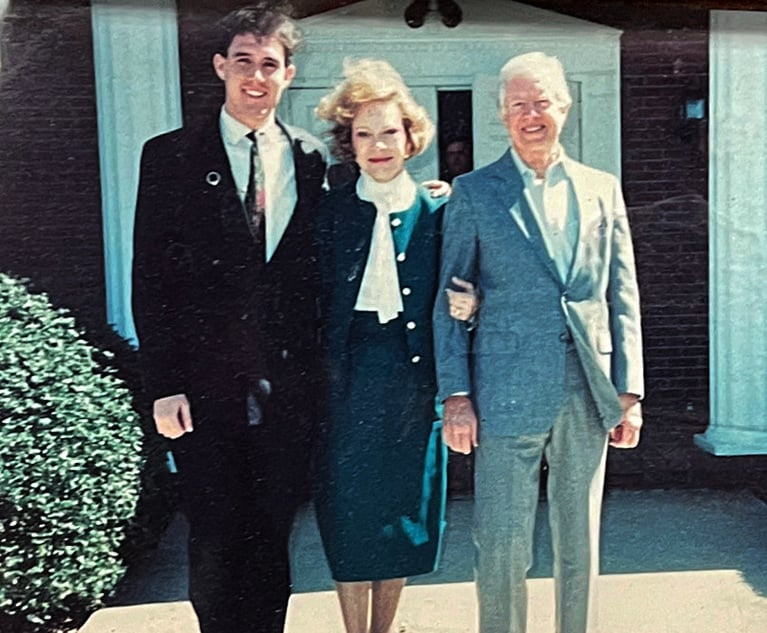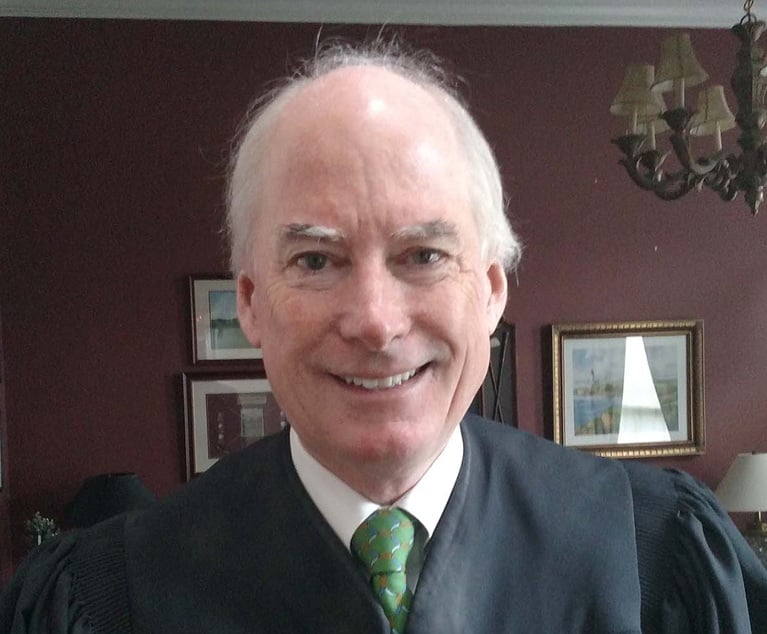 Photo Illustration: Jason Doiy/ALM
Photo Illustration: Jason Doiy/ALM'The End of the World': Small Missteps Carry Stiff Penalties in Attorney-Ethics Cases
Attorneys practicing in Connecticut found more than 800 ways to land themselves in trouble between September 2014 and August 2019, according to data collected from the Connecticut Office of Chief Disciplinary Counsel.
September 24, 2019 at 11:37 AM
6 minute read
In the world of attorney discipline, failing to respond to a client can carry the same punishment as a jailable federal offense, such as child-pornography possession, according to a Connecticut Law Tribune's review of more than 800 lawyer-ethics cases.
<a href="https://www.law.com/ctlawtribune/2019/09/25/special-report-on-attorneys-in-trouble-11-takeaways-from-statewide-grievances/" target="_blank"
 Click here to read special report
Click here to read special report
Violations often weren't in direct proportion to punishment, the data show, as motive, remorse and prior disciplinary history all played a part in sentencing.
For instance, an attorney who lied to the court about whether he'd filed an appearance in a case got the same punishment—suspension—as one who pleaded guilty to possessing child pornography, according to the review of ethics cases before the Connecticut Office of Chief Disciplinary Counsel from January 2014 to August 2019. The first case led to a 12-month suspension, while the second was for 41 months, but both attorneys lost their ability to practice, despite their disparate offenses.
In other proceedings, a violation for bank, mail and wire fraud resulted in a 20-month suspension that matched a comparable prison term, while failing to communicate with a client ended with the offender's license suspended for one year.
On one hand, critics say even lawyers' unintentional errors can have far-reaching consequences, since attorneys often represent laypeople in high-risk situations.
But on the other hand, some lawyers say punishment should depend on the context and frequency of mistakes.
Andrew Berman, a partner at Young, Berman, Karpf & Gonzalez in Miami, represents clients in high-profile bar discipline cases and has given lectures on ethical pitfalls for attorneys. He points out that the bar disciplinary system is not a substitute for legal malpractice claims.
"Lawyers are people. They're human. They're going to slip up once in a while," Berman said. "If it's an isolated slipup, then the bar could say, 'You know what? Sue for malpractice, because we don't think the lawyer acted unethically. They made a mistake.'"
Ethics and white-collar defense attorney Brian Tannebaum echoed that sentiment.
In Tannebaum's view, not even a pattern of misconduct should mean disbarment, if there's potential for reform or improvement.
"Lawyers who just drop the ball can commit some pretty serious negligence, but in those cases what I would look at, and what I think the court does look at, is how much has this happened?" Tannebaum said. "Is this a pattern and practice of this lawyer, or was this just a one-time thing, even if the result for the client was really bad?"
|Larry Noodles
In the case of New Haven civil and criminal defense lawyer Lawrence Dressler, the violations had far-reaching consequences.
Dressler, who got involved in a mortgage fraud scheme, pleaded guilty to one count of conspiracy to commit mail, wire and bank fraud. He was sentenced to 20 months in prison, and ordered to pay $403,450 in restitution.
Being convicted of a felony can lead to disbarment, but Dressler was not disbarred. His license was suspended for 20 months, as the five-year data show the majority of disbarments in Connecticut stemmed from violations in other states.
For instance, attorney Herbert Feuerhake lost his Connecticut law licence for five years after practicing in Delaware while suspended, and Yvonne Debenedetto was disbarred in Connecticut after she was convicted in New York for her involvement in a scheme that took more than $1 million from clients by sabotaging real estate deals. Massachusetts personal injury lawyer Ross Annenberg also landed a Connecticut disbarment for misusing $50,000 in client funds.
In one of the rare cases of disbarment over Connecticut offenses, Glastonbury's Craig Larsen was disbarred for 20 years in 2017 for stealing $100,000 from a client. Larsen later reimbursed the stolen funds and paid $175,000 in investigative costs.
But Dressler, who was admitted to the bar in 1992, said he feels Connecticut's response to convicted lawyers is harsher than it used to be.
"They're taking a much harder view of attorneys that make one mistake," he said. "It's like the end of the world. They don't give a second chance and they don't really look into your case."
Dressler is now eligible to apply for reinstatement, but says he's taking time to prepare for the inevitable scrutiny that entails.
"I have set high standards for myself, even as a convicted felon and disgraced attorney," he wrote on a blog he created to document the experiences of Larry Noodles, a nickname he acquired at Otisville Federal Prison after he was caught smuggling cooked spiral pasta to his cell from his job at the prison warehouse.
The blog paints Dressler's role in the fraud as a small cog in a large scam involving many people, only 10 of whom were indicted. Dressler was one of four lawyers who profited from closing fees in fraudulent real estate transactions, in which they'd request inflated sums from lenders by falsifying information in support of loans. Dressler's blog claims sellers made hundreds of thousand of dollars from the scheme, but none were indicted.
Most grievances against attorneys stem from an alleged lack of communication, though it's worth noting that the majority of complaints never make it to the disciplinary stage, according to University of Connecticut law professor Leslie Levin, who practiced law for 14 years and has focused her research on ethical decision-making.
"Just because a lawyer receives a grievance doesn't mean that the lawyer actually did something wrong," Levin said. "There's a lot of grievances that come from clients who are just unhappy with their lawyer, so you need to kind of weed through the grievances to see, OK, which ones are really meritorious and which ones are just clients who don't want to pay their bills, or clients who aren't happy with the result?"
Illustrations by David Palmer and Jason Doiy.
Read more:
This content has been archived. It is available through our partners, LexisNexis® and Bloomberg Law.
To view this content, please continue to their sites.
Not a Lexis Subscriber?
Subscribe Now
Not a Bloomberg Law Subscriber?
Subscribe Now
NOT FOR REPRINT
© 2024 ALM Global, LLC, All Rights Reserved. Request academic re-use from www.copyright.com. All other uses, submit a request to [email protected]. For more information visit Asset & Logo Licensing.
You Might Like
View All
Lessons in Mediation & Negotiation: Attorneys' Reflections on Jimmy Carter

Managing Partner Vindicated in Disciplinary Proceeding Brought by Former Associate
5 minute read
2nd Circuit Revives Connecticut Lawyers' Challenge to Anti-Discrimination Ethics Rule

Trending Stories
- 1Data Breach Lawsuit Against Byte Federal Among 1,500 Targeting Companies in 2024
- 2Counterfeiters Ride Surge in Tabletop Games’ Popularity, Challenging IP Owners to Keep Up
- 3Health Care Data Breach Class Actions Saw December Surge in NY Courts
- 4Florida Supreme Court Disbars 3, Suspends 11, Reprimands 1 in Final Disciplinary Order of 2024
- 5Chief Justice Roberts Ends Year With Defense Against 'Illegitimate' Attacks on Judiciary
Who Got The Work
Michael G. Bongiorno, Andrew Scott Dulberg and Elizabeth E. Driscoll from Wilmer Cutler Pickering Hale and Dorr have stepped in to represent Symbotic Inc., an A.I.-enabled technology platform that focuses on increasing supply chain efficiency, and other defendants in a pending shareholder derivative lawsuit. The case, filed Oct. 2 in Massachusetts District Court by the Brown Law Firm on behalf of Stephen Austen, accuses certain officers and directors of misleading investors in regard to Symbotic's potential for margin growth by failing to disclose that the company was not equipped to timely deploy its systems or manage expenses through project delays. The case, assigned to U.S. District Judge Nathaniel M. Gorton, is 1:24-cv-12522, Austen v. Cohen et al.
Who Got The Work
Edmund Polubinski and Marie Killmond of Davis Polk & Wardwell have entered appearances for data platform software development company MongoDB and other defendants in a pending shareholder derivative lawsuit. The action, filed Oct. 7 in New York Southern District Court by the Brown Law Firm, accuses the company's directors and/or officers of falsely expressing confidence in the company’s restructuring of its sales incentive plan and downplaying the severity of decreases in its upfront commitments. The case is 1:24-cv-07594, Roy v. Ittycheria et al.
Who Got The Work
Amy O. Bruchs and Kurt F. Ellison of Michael Best & Friedrich have entered appearances for Epic Systems Corp. in a pending employment discrimination lawsuit. The suit was filed Sept. 7 in Wisconsin Western District Court by Levine Eisberner LLC and Siri & Glimstad on behalf of a project manager who claims that he was wrongfully terminated after applying for a religious exemption to the defendant's COVID-19 vaccine mandate. The case, assigned to U.S. Magistrate Judge Anita Marie Boor, is 3:24-cv-00630, Secker, Nathan v. Epic Systems Corporation.
Who Got The Work
David X. Sullivan, Thomas J. Finn and Gregory A. Hall from McCarter & English have entered appearances for Sunrun Installation Services in a pending civil rights lawsuit. The complaint was filed Sept. 4 in Connecticut District Court by attorney Robert M. Berke on behalf of former employee George Edward Steins, who was arrested and charged with employing an unregistered home improvement salesperson. The complaint alleges that had Sunrun informed the Connecticut Department of Consumer Protection that the plaintiff's employment had ended in 2017 and that he no longer held Sunrun's home improvement contractor license, he would not have been hit with charges, which were dismissed in May 2024. The case, assigned to U.S. District Judge Jeffrey A. Meyer, is 3:24-cv-01423, Steins v. Sunrun, Inc. et al.
Who Got The Work
Greenberg Traurig shareholder Joshua L. Raskin has entered an appearance for boohoo.com UK Ltd. in a pending patent infringement lawsuit. The suit, filed Sept. 3 in Texas Eastern District Court by Rozier Hardt McDonough on behalf of Alto Dynamics, asserts five patents related to an online shopping platform. The case, assigned to U.S. District Judge Rodney Gilstrap, is 2:24-cv-00719, Alto Dynamics, LLC v. boohoo.com UK Limited.
Featured Firms
Law Offices of Gary Martin Hays & Associates, P.C.
(470) 294-1674
Law Offices of Mark E. Salomone
(857) 444-6468
Smith & Hassler
(713) 739-1250










